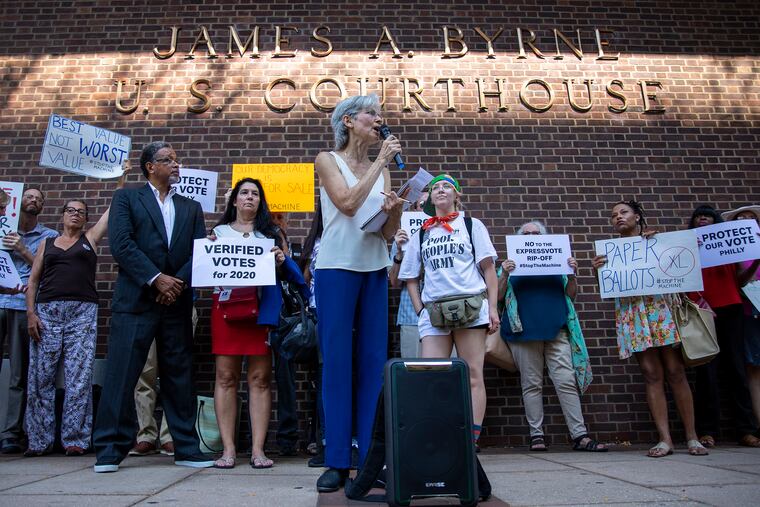Jill Stein wants a federal court to block Philadelphia’s voting machines
Jill Stein asked a federal court to bar Philadelphia’s new voting machines from being used, saying Pennsylvania should never have approved the machines and is breaking the terms of a settlement she reached late last year with the Pennsylvania Department of State.

Jill Stein, the 2016 Green Party presidential candidate, asked a federal court Tuesday to block the future use of Philadelphia’s new voting machines, saying Pennsylvania should never have approved the machines and is violating the terms of a settlement she reached late last year with the state.
That agreement, which ended her 2016 election recount lawsuit, requires Pennsylvania Department of State to only certify machines that use voter-verifiable paper ballots that can be audited after an election. Prior to the settlement, Gov. Tom Wolf last year ordered every county to buy new voting machines that create such a paper trail.
But the system used in Philadelphia and other counties, ExpressVote XL from vendor Election Systems & Software (ES&S), is insecure and violates that agreement, Stein said. In the motion filed Tuesday, Stein and Pennsylvania voters who joined in her lawsuit asked the federal court in Philadelphia to order the Department of State to immediately decertify ExpressVote XL and block it from being recertified.
"Pennsylvania officials have insisted on ramming these machines through in a secretive, heavy-handed process,” Stein said in a statement. “They’ve left us no other option but to ask the court to enforce our settlement agreement to ensure that Pennsylvania voters have a voting system they can trust in time for the 2020 elections.”
The Pennsylvania Department of State declined to comment. If Stein is successful, counties in the state would be prohibited from using the machines, and those that already have them would be forced to buy new ones before the 2020 election.
» READ MORE: Green Party’s Jill Stein threatens legal challenge to Philly’s new, $29M voting machines
Stein’s motion argued that the new machines don’t produce true paper ballots that can be verified by voters, that election results are determined based on printed bar codes that voters cannot read, and that the machines are insecure and could allow ballots to be modified after submission.
Taken together, Stein said, those issues make it impossible for voters to verify their selections are recorded and counted properly. And it also makes it impossible to audit and confirm the results of an election conducted on the machines.
A spokesperson for ES&S said the system “has been through hundreds of thousands of hours of testing,” and noted that it was certified first by the federal Election Assistance Commission and then twice by the Pennsylvania Department of State.
“They put the ExpressVote XL through extensive testing not just once, but twice," spokesperson Katina Granger said in an email. "By all accounts, it meets and exceeds the highest standards for security, accuracy and accessibility.”
Although Stein’s campaign drew just 1% of the vote in 2016, some Democrats believe she had an outsize role that election year. They blamed her for taking votes from Hillary Clinton and helping swing the election to Donald Trump.
Philadelphia used the new machines in elections this month, at a cost of $29 million. Northampton County also used the system this month, encountering problems in which votes were inaccurately counted on Election Day. Cumberland County plans to use it next year. Other counties have not yet chosen their machines.
All voting machines used in Pennsylvania must be certified by the Department of State. Last year, after Wolf required all counties to buy new machines, the department began testing various systems. It approved ExpressVote XL in November. Since then, Stein has asked the Department of State several times to decertify the machines and warned of legal action.
A group of advocates for hand-marked paper ballots had urged Philadelphia elections officials not to choose ExpressVote XL. Since ExpressVote XL was selected in February, advocates have been pushing officials to reverse course. The advocates argue that the touchscreen machines are more costly and less secure than paper ballots that voters manually fill out.
When those advocates led an effort to have the state reevaluate the system, Stein sent the state a letter asking it to rescind the certification. The department, in its response, said it disagreed.
Last month, Stein again asked the state to block use of the machines, but the Department of State again declined to do so. During a phone call the day after the election, the two sides “were unable to resolve their differences,” Stein said in her motion Tuesday. A few days later, Stein asked one last time whether the state would decertify the machines, based on the problems in Northampton. The state declined.
U.S. District Court Judge Paul S. Diamond on Tuesday asked the Department of State to respond by Dec. 12 to Stein’s filing.